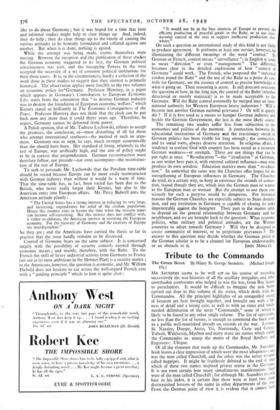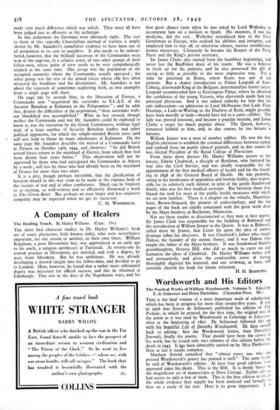Tribute to the Commando
The Green Beret. By Hilary St. George Saunders. (Michael Joseph. 15s.)
MR. SAUNDERS seems to be well se, on his course of recording successively the war-histories of all the ancillary irregulars and other unorthodox combatants who helped to win the war, from Boy Scouts to parachutists. It would be difficult to imagine the task better carried out than in this volume of thi. series, which deals with the Commandos. All the principal highlights of an unequalled record of heroism are here brought together, and brought out with a ful- ness of detail and a loving care, as well as with an exact and much- needed delimitation of the term " Commando," none of which si likely to be found in any other single volume. The list of operations, no less than the list of heroes, is enough to commend the book even to a public well-nourished already on records of the war. Lofoten, St. Nazairc, Dieppe, Anzio, Vis, Normandy, Crete and Greece, Tobruk, Walcheren, Myebon and many more are names which entitle the Commandos to •usurp the motto of the Royal Artillery and Engineers : Ubique. Of all the elements that made up the Commandos, Mr. Saunderi' book leaves a clear impression of which were the most ubiquitous; one was the man called Churchill, and the other was the secret weapon called bagpipes. It might be fruitlessly debated to the end of time which of these two names inspired greater terror in the German, It is not even certain how many simultaneous manifestations the were of the man called Churchill ; for although Mr. Saunders records four in his index, it is certain that there were at least two more distinguished bearers of the name in other departments of the war; From the German point of view it is evident that it cannot
made very much difference which was which. They must all have been judged just as offensive as the archetype.
In this judgement the Germans were obviously right. The cost to them of this typically Churchillian method of warfare is amply shown by Mr. Saunders's cumulative evidence to have been out of all proportion to its cost to ourselves. It also needs to be remem- bered, however, that the brilliant successes of the Commandos were won at the expense, in a 'dative sense, of two other groups of their fellow-men, whose point of view needs to be very sympathetically studied at the same time. One group was the population of the occupied countries where the Commandos usually operated ; the other group was the rest of the armed forces whose role less often attracted, the headlines and the decorations. Mr. Saunders is not above the reproach of sometimes neglecting both, as two examples from a single page will show.
On page 292 he records how, in the liberation of Greece, a
Commando unit " negotiated the surrender to E.L.A.S. of the Security Battalion at Kalamata in the Peloponnese" ; and he adds that, despite the difficulties of the:negotiation, "their surrender with- out bloodshed was accomplished." What in fact ensued, though neither the Commando unit nor Mr. Saunders could be expected to know it, was the execution by the Greek Communists, without legal trial, of a large number of Security Battalion leaders and other political opponents, for which the simple-minded British were (and still are) held to blame by many inhabitants of Kalamata. On the same page Mr. Saunders describes the arrival of a Commando force at Piraeus on October 14th, 1944, and observes: " So did British armed forces return to the mainland of Greece, from which they had been driven four years before." This observation will not be approved by those who had anticipated the Commandos in Athens by a week ; still less by those who had already been on the mainland of Greece for more than two years.
It is a pity, though perhaps inevitable, that the glorification of heroism should in this way seem to be made at the expense both of the victims of war and of other combatants. Much can be forgiven to so exciting, so well-written and so effectively illustrated a work as The Green Beret. But perhaps an even larger and less exclusive sympathy may be expected when we get its successor.
C. M. WOODHOUSE.







































 Previous page
Previous page